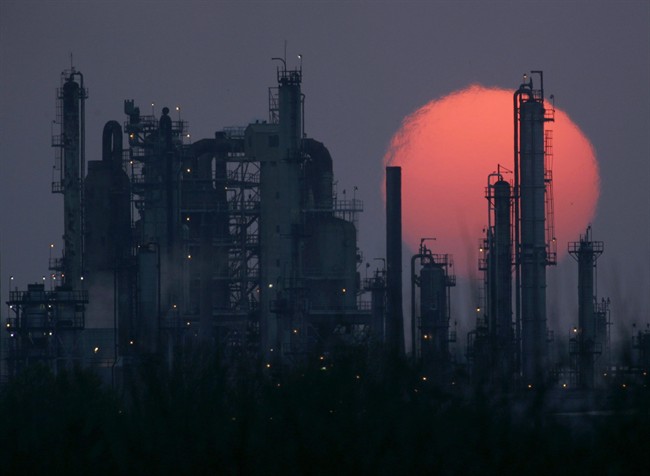CALGARY – A bitumen refinery backed by the Alberta government that is being built northeast of Edmonton can still turn a tidy profit despite a major cost overrun and delay, the chairman of North West Upgrading Inc. said Thursday.

Ian MacGregor said he was surprised and disappointed when he learned the pricetag of the Sturgeon Refinery had ballooned to $8.5 billion — a 50 per cent increase from its most recent estimate.
But MacGregor said converting oilsands bitumen into ultra low sulphur diesel can rake in $45-per-barrel margins these days — way up from just $6 in 2010.
A lot of that is a function of pipeline bottlenecks preventing that bitumen from getting to the most lucrative markets and depressing the price of the raw product.
“To date, the margins have never been stronger,” MacGregor said.
“I don’t think anybody thinks that we’re going to solve the transportation bottlenecks facing Western Canada anytime soon.”
The Sturgeon Upgrader is a partnership between North West and oil giant Canadian Natural Resources Ltd.,Canadian Natural Resources LtdCanaCAn. to build a 50,000-barrel-per-day refinery.
Three quarters of its feedstock comes from the Alberta government, which collects some of its oilsands royalties in bitumen rather than cash as part of a program to boost the province’s refining and upgrading sector. The rest comes from Canadian Natural.
Canadian Natural and Alberta Petroleum Marketing Commission, a Crown corporation, are reworking the project’s processing agreements to allow for more financial flexibility.

Get weekly money news
Alberta Energy Minister Ken Hughes says the government stands behind the project and will help make sure it’s completed with a loan to the partnership at a commercial interest rate.
“The strategic reasons that led us into this partnership are as valid today as they were when the Government of Alberta committed to it three years ago,” he said in an emailed statement.
“The project remains a good deal for taxpayers. With the persistent discount on bitumen — the bitumen bubble — and equally persistent high prices for transportation fuels, we continue to expect a better return for Albertans’ barrels of bitumen through this enterprise than if we simply took the royalties in cash.”
“In addition, the Sturgeon Refinery will provide a secure local market for 50,000 barrels per day of bitumen production, avoiding the need to transport this outside the province for processing.”
University of Alberta economist Andrew Leach said a lot of blanks remain unfilled he’d like to see the province provide some hard numbers to support its view that the project is viable in the long term.
“For the Alberta government to end up ahead on this commitment, what does the bitumen-diesel spread have to be over the life of this project? Juts a simple, break-even calculation — I don’t think we’ve seen that,” said Leach.
“I think the energy minister needs to step out and explain this contract and the changes to Albertans really clearly.”
Roger McKnight, with energy consulting firm En-Pro International, said he’s got some questions about what kind of diesel price the partners hope to get, especially when Suncor Energy Inc., Imperial Oil Ltd. and Royal Dutch Shell churn out that same type of fuel in the same region.
“The price of diesel isn’t something that you just pull out of the air,” McKnight said.
Likening the North American refining industry to a “dinosaur,” McKnight said refiners have been having a tough go of it, with facilities in Montreal and Dartmouth, N.S., closing in recent years.
“Why in the world would anybody want to build a refinery northeast of Edmonton?”
But North West’s MacGregor said the market looks good for the diesel the Sturgeon refinery will produce.
“Alberta’s perennially diesel-short. Every year in the spring we run out of diesel,” he said. “This market is really short and it’s one of the highest priced markets in Canada.”





Comments